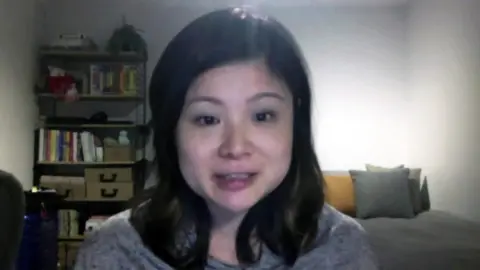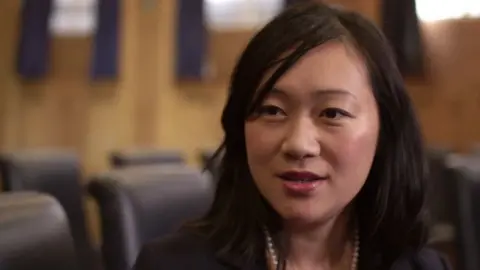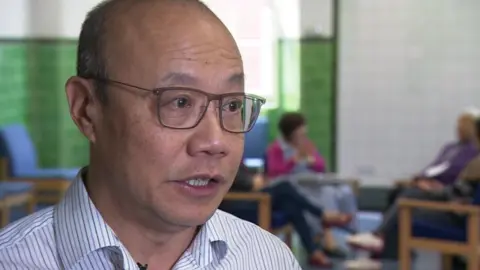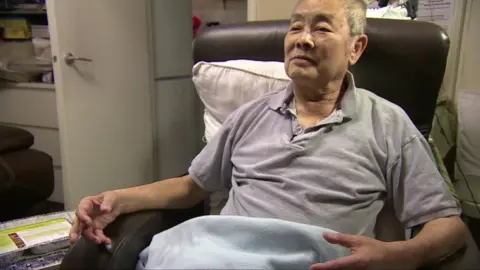Why British Chinese mothers won't go out after giving birth
 BBC
BBC"Postnatal confinement" - where new mothers do not leave the house, have visitors or shower for a month after giving birth - is said to be widespread among the UK's Chinese community. Experts warn that few in the medical profession know this occurs.
"Being confined in your flat is important," says Ching Ching Turner, from her home in London that she has not left since giving birth 28 days earlier.
She speaks to the BBC's Victoria Derbyshire programme via video call, as visitors are not allowed.
Mrs Turner argues confinement is an important process as traditional belief is that the mother and baby's immunity is very low.
She is of Chinese ethnicity, and says: "For us, if you don't practise it you're kind of disadvantaging yourself."
Confinement is common across Asia and in China there are special hospitals where mothers stay confined for a month, sometimes only seeing their babies once a day.
It is carried out because traditional Chinese medicine asserts that women who have just given birth are more susceptible to cold air, and becoming ill as a result.
Mrs Turner, who believes she has "done confinement in a modern way" by still showering for example, says her wishes came as a surprise to her husband, who was born in the UK.
"I don't think he realised that [confinement] came with a whole set of rules," she says.
"It was a bit difficult for him as he wanted to show off his baby.
"But now we've nearly completed the month, he sees the benefits."

Dr Kit Wu, a neurologist at King's College Hospital, says postnatal confinement is a tradition so engrained in Chinese culture "that even I did it".
"Some of the very strict rules are that you shouldn't drink cold drinks during the month, you shouldn't really shower, hair washing isn't allowed and obviously not going outside the boundaries of your house.
"Some ladies who are very strict don't actually get out of bed for the first two weeks, and then do very minimal exercise after that," she adds.
Dr Wu is particularly concerned about the effect confinement has on British Chinese mothers who experience postnatal depression.
"New mums can often be left in isolation and it can be difficult to cope," she explains, adding that many will also hide the symptoms from health professionals because of the pressure within Chinese communities for giving birth to be seen as a time of happiness.
She also worries that "when mothers have medical problems, they try to deal with them themselves and that can be detrimental to the health of themselves and the baby".
In Mrs Turner's case her mother travelled from Singapore to be with her daughter.
Public Health England said: "Health visitors and midwives are specially trained and skilled in various cultural traditions and how to respect them while safeguarding the needs of the family.
"If a more tailored programme of support is needed then that will be agreed with the family."
Traditional medicine
Dr Wu says many in the Chinese community are also being "overlooked" by mainstream health services as a result of the cultural aversion to seeking help.
When contacted, the Royal College of Midwives, the Institute of Health Visiting and various maternity mental health charities said they had very little, if any, expertise in healthcare for the British Chinese.
Dr Lip Lee, a clinical oncologist at Christie's Hospital, says there is also a tendency for members of the UK's Chinese community to put on a "brave front" - including when it comes to cancer.
"Even when the doctor asks if they're in pain, they may deny it. They feel that, 'if I have cancer, it's a given, I should endure the pain' or, 'let's just treat it with traditional Chinese medicine'."

Experts also suggest that the decision not to ask for help is also harming elderly members of the UK's Chinese community, who are living alone in old age.
"There are a whole generation of first generation migrants now living in the UK and they are very isolated," explains Eddie Chan from the Chinese Healthy Living Centre in London, who also says that dementia can be heavily stigmatised among the British Chinese.
"They will find it very hard to find any mainstream services that cater to their needs," he says, explaining that this is in part because of the language barrier.
'No' to chemotherapy
Hon Cheung Tang, aged 73, lives on his own in a tiny bedsit and is unable to speak English.
He was recently diagnosed with prostate cancer, but has decided against any treatment.
He is in pain and cannot walk. Volunteer carers from the Chinese Healthy Living Centre come to see him when they can, but Mr Tang says some days he does not have a meal or a cup of water.
"One doctor tried to tell me to have chemotherapy as I will certainly die if I don't. I said, 'No, as with almost all cancers you're certain to die or you won't last long'," he says, contradicting medical evidence.

In Mr Tang's case, the loneliness he feels is exacerbated by the absence of his children.
"One day I was going to the bathroom, and then blacked out, felt dizzy and fell," he explains.
"I laid down on the floor for a while then realised the bed was so far away, I had to crawl there.
"I called the kids - my daughter answered but she didn't say much and they didn't turn up.
"Those few days were very bad. I don't know how I got through those days."
In a statement, the Department of Health said it wants "everyone to have the same opportunity for a long and healthy life, whoever they are, wherever they live and whatever their background".
It added: "We take a comprehensive and strategic approach to reducing health inequalities so we can address the cause of ill-health and promote healthier lifestyles."
But for Dr Wu, more needs to be done to understand the Chinese community.
She is calling for more data to be collected regarding their health needs - currently they are "grouped into a box along with other ethnicities", she explains.
She also wants more funding for Chinese community groups, as for many individuals they are their main and only source of support.
"Just because we're silent and polite doesn't mean we should be ignored," she says.
Watch the Victoria Derbyshire programme on weekdays between 09:00 and 11:00 on BBC Two and the BBC News Channel.
